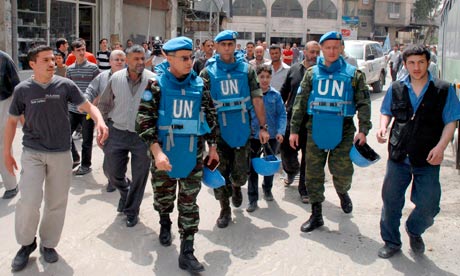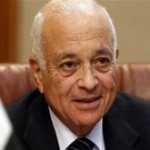The expanded mission of observers who are monitoring the ceasefire in Syria are to start deploying next week, as the UN Chief Ban Ki-moon urges freedom of access and movement for the mission.
The expanded mission of observers who are monitoring the ceasefire in Syria are to start deploying next week, as the UN Chief Ban Ki-moon urges freedom of access and movement for the mission.
Ban called on President Bashar Assad’s regime to protect the observers and allow them to travel freely throughout the country.
"It is absolutely important that the Syrian government should provide full protection of our monitors and ensure their freedom of access, freedom of movement", Ban told reporters.
He said President Assad must ensure "cooperation from the Syrian government, including air assets mobility", such as airplanes and helicopter, adding he had conveyed that message to Syria's UN envoy Bashar Jaafari last week.
Ban also hoped Damascus would "fully cooperate" with UN and Arab League envoy Kofi Annan, who devised a six-point peace plan aimed at ending the crisis in Syria.
For his part, deputy UN spokesman Eduardo del Buey told Agence France Press that the decision has been taken" and the the deployment of 300 monitors will start in "phases" starting next week.
The deployment of an advance party of 30 observers "is expected to be completed by the end of April and the expeditious deployment of the rest of the military observers is a priority," he added.
A UN Security Council resolution passed on Saturday gave Ban the duty to make an "assessment" on whether it was safe for the full team of unarmed monitors to go.
Ban's political chief told the UN Security Council that Assad’s compliance with a cessation of hostilities "remains incomplete”.
"But it is our hope that the deployment of observers will help to stop the killing and consolidate the calm", UN Under-Secretary General B. Lynn Pascoe said.
"We are at a pivotal moment in Syria".
ARABI: CEASEFIRE AND POLITICAL PROCESS On the other hand, Arab League Secretary General Nabil El-Arabi called on Monday for a ceasefire and the start of a political process to end the Syrian crisis.
On the other hand, Arab League Secretary General Nabil El-Arabi called on Monday for a ceasefire and the start of a political process to end the Syrian crisis.
"There's now an international consensus on two points -- a global ceasefire and the start of a political process," El-Arabi told reporters at a press conference held jointly with Algerian Foreign Minister Mourad Medelci.
"A political solution cannot be considered separately from today's goal of achieving a ceasefire," he said.
El-Arabi said the ball was now in the court of international envoy Kofi Annan's whose peace plan for Syria has led to a drop in recent violence.